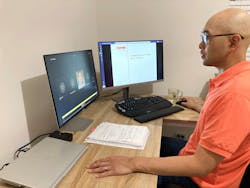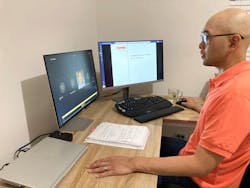Utility Engineers Pursue Education and Career Development from Home
Effective workflow has become one of the foremost priorities of an organization. Maintaining business continuity in times of change hinges on effective and efficient workers. No matter where work is taking place or how many are working, agile transformation to an uncertain economy will rely even more on collective human capital that is optimally trained.
Commonwealth Edison (ComEd) shifted all of its technical staff to remote work as employees sheltered in place for most of March, April, and May. Engineering departments across the organization — including those responsible for field operations and maintenance — had to quickly shift work processes and practices to both maintain operations and ensure safety.
The company found that technology could replicate and/or support many existing practices. Video conferencing and streaming could enable technical staff to observe real-time work on physical infrastructure; collaboration applications like Microsoft Teams could ensure constant contact and informal collaboration within and across teams. However, it also learned that apps alone are no substitute for consistent and coherent communication and feedback, and that informal and formal learning must go on, even and especially when personnel are not in office.
Here, we describe two of the most important learnings the company has discovered and embraced, as well as their implications for future efforts.
Communications and collaboration as strategy
Like managers at many organizations, ComEd leaders were comfortable in the status quo of weekly team meetings and/or email updates. Having all workers in a centralized location, where managers could engage direct reports as needed, ensured constant contact without the need of a formal communications strategy.
However, with its workforce required to be at home, the company was suddenly decentralized, necessitating a more effortful approach to monitoring and supporting staff. Managers had to pivot, and quickly. While workstreams and work processes would remain the same, the task of ensuring their execution would not.
First, managers had to intentionally communicate more. Many in the organization implemented morning huddles for their teams to allow employees to share what they were working on and seek clarity for any questions or concerns they might have about project tasks. This information would then be used to determine individual support needs and collaboration opportunities. Many managers also increased individual check-ins, using text messaging and phone calls to clarify assignments and provide feedback dailyThe benefits of maintaining, and even increasing, existing communication and collaboration practices go beyond coherence and continuity. Managers report that sustaining consistent communication and regular professional development maintained opportunities for engagement with staff in other departments and across the organization. Individual contributors, particularly junior engineers, have more opportunities to communicate their technical knowledge and take on new tasks and learning opportunities. Nonetheless, more may need to be done to replicate the professional developmental opportunities that used to emerge from meeting at the coffee urn.
Looking at the bigger picture
ComEd is undertaking plans for where — and, in some cases, when — employees work and how they'll be trained to do that work. The company has titled this effort 'Learning Transformation' and is involving key stakeholders from across its engineering units in support.
Transformation is already the norm in an industry where emerging technologies are rapidly changing decades-old practices. So inspiring and ensuring lasting change in people that can keep pace will require a three-dimensional approach to implementation. First, the program design will need to be differentiated, attending to varying knowledge and skill needs across departments, experience levels, and career pathways. Second, in an industry where so much of professional learning takes place on and through the job, the initiative will have to consider carefully how and when to leverage practice, feedback and mentoring, and formal training to build capacity.
Given the speed of technological change underway in both the industry specifically and corporate offices generally, the focus of professional learning must transition from keeping up with the times to future-proofing technical staff. This could be done by providing in-depth skill development in the kind of cross-cutting competencies (that is, advanced analytics) that are likely to be necessary in the coming years.
ComEd is seeing this short-term transition period as a potential conduit for long-term transformation. The sudden shift to remote work and virtual communication and collaboration has spawned new practices and new vigilance about the role feedback and support play in achieving business goals. New pathways are emerging that may allow the company to break down longstanding silos within and across departments, as well as rebuild work practices from the ground up.
The challenge ahead will be to ensure that the gains made in transition can be integrated into existing systems and structures, and that many of the existing features of its skill development effort — namely, the informal collaboration and on the on-the-job learning that constitutes so much of an engineer's professional development — can be maintained even as work environments and mediums shift.
Though the effects of COVID-19 on communities and companies have been severe, they also offer us a vision into the workplace and workforce of the future. As companies attempt to mitigate the negative effects of this situation on their employees, it is also an opportunity for them to see how they might do more and better in the future.
About the Author
Aleksi Paaso
ALEKSI PAASO ([email protected]) is director of distribution planning, smart grid and innovation at ComEd, where he is responsible for distribution planning activities, distributed energy resource (DER), and smart grid strategy and project execution. He is a senior member of the IEEE and vice chair of the IEEE Power & Energy Society’s (PES) Industry Technical Support – Leadership Committee (ITS-LC). He holds a Ph.D. in electrical engineering from the University of Kentucky.
Daniel Kushner
Daniel Kushner is Director of Resiliency Strategy at LUMA Energy. He holds a bachelor's degree in history from Johns Hopkins University and a PhD in political science from Brown University.
Nina Selak
Nina Selak is manager of distributed energy resource (DER) engineering at Commonwealth Edison (ComEd), where she leads efforts to operationalize technologies that enable the integration of DERs to the grid. She holds a bachelor's degree in electrical engineering from the University of British Columbia and a master's degree in renewable energy systems from the Technical University of Vienna.


